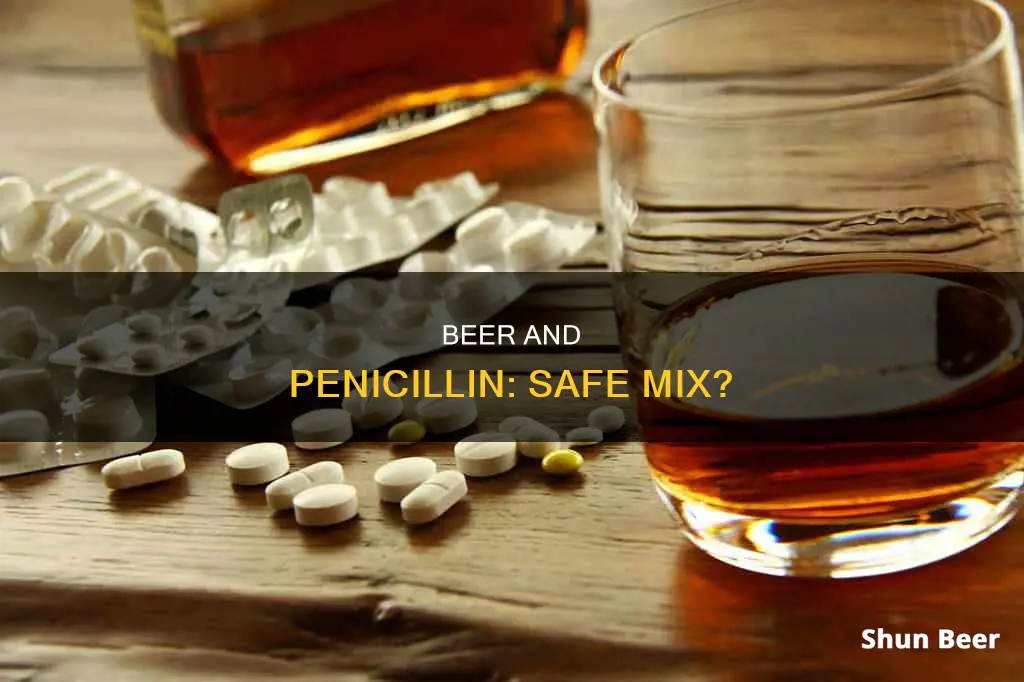
Drinking alcohol while taking antibiotics is generally not recommended due to the potential for harmful interactions and adverse side effects. Alcohol can inhibit the effectiveness of antibiotics, including penicillin, and delay recovery from illness. While there is no direct drug interaction between alcohol and penicillin, alcohol consumption can reduce immune function, potentially worsening the side effects of penicillin and other antibiotics. It is advisable to consult a doctor or pharmacist for guidance on alcohol consumption while taking specific medications.
| Characteristics | Values |
|---|---|
| Alcohol and penicillin drug interaction | No direct drug interaction found between alcohol and penicillin |
| Alcohol and penicillin side effects | Alcohol reduces immune function, which can worsen the side effects of penicillin |
| Common side effects | Upset stomach, nausea, and diarrhea |
| Alcohol and antibiotics | Alcohol inhibits the effectiveness of antibiotics |
| Alcohol and recovery | Alcohol interferes with sleep and hydration, which are critical components of recovering from a bacterial illness |
What You'll Learn

Alcohol can worsen side effects of penicillin
While there is no direct drug interaction between alcohol and penicillin, alcohol can worsen the side effects of penicillin. When the body breaks down alcohol, it produces acetaldehyde, which can cause nausea. As antibiotics like penicillin can cause stomach or digestive side effects, drinking alcohol alongside can increase feelings of nausea.
Drinking alcohol while taking penicillin can also lead to severe diarrhea, intense stomach cramping or pain, and vomiting. It can also cause a reduction in energy and delay how quickly you recover from illness. Alcohol can also negatively impact your sleep patterns, which is an essential component of recovering from an infection.
Additionally, alcohol can affect your concentration, coordination, and cognitive function. It can also disrupt the essential processes of the body, such as sleep and hydration, which are critical to recovering from a bacterial illness.
Therefore, it is generally recommended to avoid drinking alcohol while taking penicillin or other antibiotics.
Drinking Beer on Gulf Shores Beach: What's Allowed?
You may want to see also

Alcohol and penicillin can both negatively impact immune system processes
Penicillin is an antibiotic, and antibiotics work by either killing bacteria directly or preventing them from reproducing. While antibiotics are meant to support the immune system, they can also weaken it. Antibiotics can change the biochemical environment of cells, reducing the ability of immune cells to kill bacteria. Antibiotics can also have broader side effects, such as eliminating "good" bacteria in the gut and damaging liver function.
Alcohol, particularly chronic heavy drinking, affects all components of the adaptive immune system. It reduces the number of peripheral T cells, disrupts the balance between different T-cell types, influences T-cell activation, impairs T-cell functioning, and promotes T-cell apoptosis. Alcohol exposure can also cause a loss of peripheral B cells, which produce antibodies to eliminate microorganisms and prevent the spread of infections. Alcohol exposure in utero can interfere with normal T-cell and B-cell development, increasing the risk of infections during childhood and adulthood.
Both alcohol and penicillin can negatively impact immune system processes, and consuming alcohol while taking penicillin may further weaken the immune system. It is important to note that alcohol can also reduce energy levels and delay recovery from illness. Therefore, it is generally recommended to avoid alcohol until finishing a course of antibiotics and feeling better.
Pregnant Women and NA Beer: What's the Verdict?
You may want to see also

Alcohol can hinder the body's ability to absorb nutrients
While there is no direct drug interaction between alcohol and penicillin, it is still advised to avoid drinking alcohol while taking this antibiotic. This is because alcohol can hinder the body's ability to absorb vital nutrients, increase blood sugar levels, and zap energy levels, all of which can reduce the body's ability to heal from an infection.
Drinking alcohol can also disrupt sleep patterns and cause dehydration, both of which are critical components of recovering from a bacterial illness. Additionally, alcohol can cause or worsen nausea, digestive problems, and other gastrointestinal issues, which are common side effects of antibiotics.
Furthermore, alcohol can negatively impact cognitive function, concentration, and coordination, which may already be affected by antibiotics.
For these reasons, it is generally recommended to avoid alcohol until you have completed your course of antibiotics and are feeling better.
Beer and Chemo: What's Safe to Drink?
You may want to see also

Alcohol can disrupt sleep patterns
Drinking alcohol can disrupt sleep patterns. Even a couple of drinks can affect the quality of your sleep. Alcohol can cause you to spend less time in the important REM stage of sleep, resulting in you waking up feeling less refreshed.
Drinking alcohol can also lead to snoring and sleep apnoea. It relaxes the muscles in your body, which can cause the tissue in your throat, mouth, and nose to stop air from flowing smoothly, leading to snoring. Alcohol increases the chance of suffering from sleep apnoea, a condition that narrows your airways and can stop you from breathing properly at night.
Alcohol can also interfere with your body's circadian rhythms. It can decrease the body's sensitivity to cues like daylight and darkness, which trigger shifts in body temperature and the secretion of the sleep hormone melatonin. This interference can cause you to feel alert when you want to sleep and sleepy when you want to be awake.
Experts recommend avoiding alcohol at least three hours before bed. The more alcohol you drink and the closer you drink it to bedtime, the stronger its effects will be.
How Long Does Beer Last After Opening?
You may want to see also

Alcohol can slow down the recovery process
While it is essential to follow your doctor's advice and read the medication leaflet for specific instructions, here is some general information on why alcohol can slow down the recovery process when taking penicillin.
Drinking alcohol while taking penicillin or other antibiotics is generally not recommended due to the potential negative impact on the recovery process. Alcohol can interfere with the body's ability to heal from an infection in several ways. Firstly, it can disrupt sleep patterns, preventing you from getting a good night's rest, which is crucial for recovery. Secondly, alcohol can hinder the absorption of vital nutrients, increase blood sugar levels, and deplete energy levels, all of which are necessary for the body to recover effectively. Additionally, alcohol can cause or worsen nausea and digestive issues, which are common side effects of antibiotics.
Furthermore, alcohol can negatively affect the immune system, making it more challenging for your body to fight off infections. This delay in recovery time may increase your risk of developing another infection. Alcohol can also impair cognitive function, concentration, and coordination, which are essential for maintaining good health and adhering to any necessary lifestyle changes during the recovery period.
In addition to the direct impact on the recovery process, consuming alcohol while taking penicillin or other antibiotics can lead to unpleasant and potentially dangerous side effects. These side effects may include severe fatigue, headaches, dizziness, anxiety, chest pain, heart palpitations, digestive issues, and seizures. The combination of alcohol and antibiotics can also damage vital organs, such as the liver and kidneys. Therefore, it is generally advisable to avoid alcohol until you have completed your course of antibiotics and are feeling better.
Drinking Beer While on Norvasc: What You Need to Know
You may want to see also
Frequently asked questions
It is not recommended to drink alcohol while taking penicillin or other antibiotics. While there is no direct drug interaction between alcohol and penicillin, alcohol can reduce your immune function, which may cause the side effects of penicillin to worsen.
Some side effects that may be more severe after combining alcohol and penicillin include an upset stomach, nausea, and diarrhea.
It is best to avoid drinking alcohol until your treatment with penicillin ends.
Drinking alcohol while taking penicillin can make bacterial infections harder to treat and may reduce the effectiveness of the antibiotic. It can also cause unpleasant side effects such as nausea and vomiting.
It is recommended to avoid taking penicillin with non-steroidal anti-inflammatory drugs (NSAIDs) and beta-blockers, as they can interact with the antibiotic and cause side effects.







